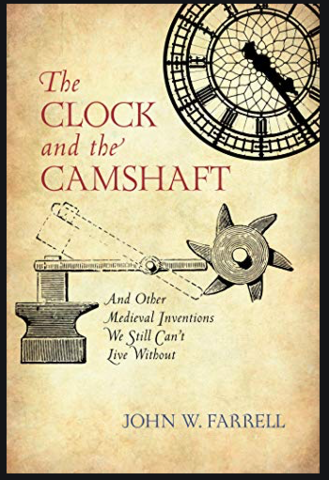- Listen to Ron's Interview with John W. Farrell -
Searching for the Origin of Today’s Technology in the Middle Ages
Episode description:
Over the last half century, we’ve witnessed a blizzard of technological advances that have had a profound impact on our daily lives. But if we take the time to reflect for a moment, and look around at the commonplace devices we take for granted, we would discover that many of them had their origin during an era we don’t normally associate with innovation—the Middle Ages. In today’s episode, author and producer John W. Farrell takes us through a fascinating series of stories in his book, “The Clock and the Camshaft,” that describe how dozens of inventions that are part of virtually every aspect of contemporary technology had their roots in medieval times, between the eleventh and fourteenth centuries. John takes us behind the invention of a key mechanism leading to the mechanical clock—perhaps as a means of automating the ringing of church bells. He’ll explain how cylindrical axles know as camshafts originated in windmills—centuries before they evolved into a key component of internal combustion engines. He’ll take us through architectural innovations like the flying buttresses, which allowed the design of grand cathedrals that dwarfed buildings of the Roman empire. Then there were social inventions such as universities, ignited by the popes as a way to protect the church against the power of European monarchs. And the mariner’s astrolabe and the compass—tools that helped spur the expansion of European trade and enabled navigators like Columbus to take real chances outside the comfortable commerce between Mediterranean port cities. Perhaps most remarkable theme throughout John Farrell’s stories is the refreshing discovery that many of the world’s most important inventions were not only due to the ingenuity and hard work of prominent individuals, but thanks to the work of everyday people whose names may be unknown, but whose legacy laid the foundations of the modern world.
Guest description:
John W. Farrell is a writer and producer working in Boston. He is the author of The Day Without Yesterday: Lemaître, Einstein and the Birth of Modern Cosmology. A graduate of Harvard College with a B.A. in English and American Literature, Farrell has written for the Wall Street Journal, New Scientist, the Boston Globe, National Review, Salon, and the Huffington Post, and he writes a science blog for Forbes. In 2010, he was a Templeton-Cambridge Journalism Fellow in Science and Religion.



